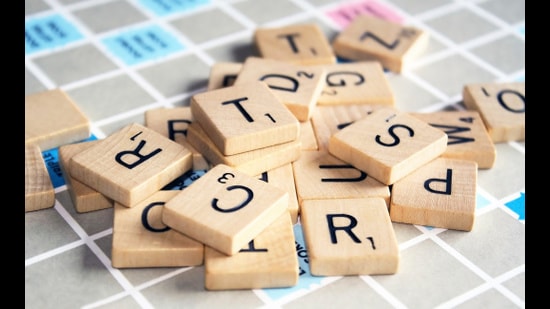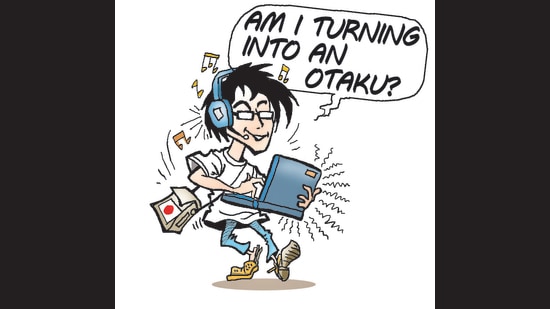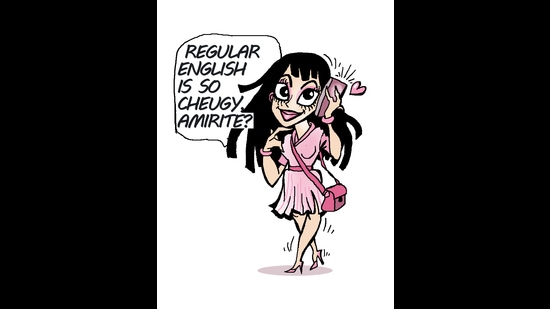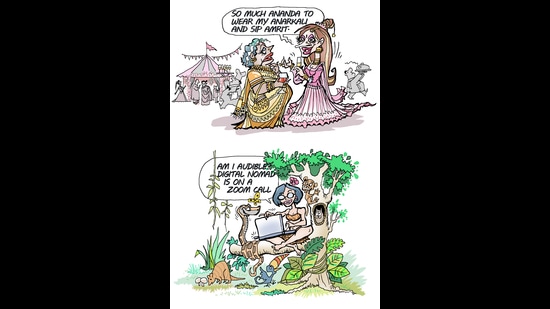[unable to retrieve full-text content]
Dictionary.com anoints allyship word of the year for 2021 Durham Herald SunSunday, December 5, 2021
Collins Dictionary Declares NFTs Word of the Year. But What Exactly Are They? - Motley Fool - Dictionary

Collins Dictionary picked NFT -- short for non-fungible token -- as its word of the year for 2021. NFT wasn't the only crypto-related lingo to make it into the top 10. Metaverse and crypto are both on the list as well.
Unsurprisingly, a couple of pandemic terms -- hybrid working and double-vaxxed -- are up there as well. And cheugy -- referring to something that's no longer cool -- is definitely still cool enough to be in Collins' top words of 2021.
So, what exactly is an NFT?
Collins describes NFTs as, "A unique digital certificate, registered in a blockchain, that is used to record ownership of an asset such as an artwork or a collectible."
NFTs come in many different shapes and sizes. They get used for things like digital art, gaming, music, and sports trading cards. The item itself isn't important. The NFT is the token that contains authorship and ownership information for that item.
An NFT is a certificate that gets stored on the blockchain, so it can't be tampered with. In some cases, the token will include a clause that gives the original creator a cut each time the item is sold.
Fungible tokens are non-unique assets that are divisible. For example, one dollar bill is worth the same as another dollar bill -- and it can be broken down into four quarters. In contrast, a non-fungible token is unique. Imagine if Johnny Depp autographed that dollar bill. Not only would that dollar now be unique, it would also be worth more than a dollar. It would be non-fungible.
By that same logic, a digital image might be shared for free all over the internet. But an NFT is like an autographed version of that image. The act of making an NFT would make it unique and give it value.
What are NFTs used for?
We mentioned a few uses of NFTs above, so let's look at some of them in more detail.
1. NFTs in art
NFT art selling for millions is what's really grabbed the headlines. The most expensive piece of digital art so far was Beeple's "Everydays: The First 5,000 Days," which was sold by Christie's at auction for over $69 million.
In theory, it is a way to record the provenance and authenticity of a piece of art. The blockchain record proves ownership and authorship. It can also give digital artists a way to monetize their creations.
2. NFTs as collectibles
The most common form of NFT collectibles is probably sports trading cards. For example, the NBA created a Top Shot collection of video clips from famous game highlights. Fans can collect and trade these NFT clips in much the same way as they would physical cards. Even though that same clip may have been shared millions of times online, an NFT of that clip could be a valuable collectible.
3. NFTs in gaming and the metaverse
Years ago, you might have played a video game to earn points or win certain items/improvements for your character. When you stopped playing that game, the points or items you earned would not have any value.
These days, those same in-game items may be NFTs, and you would actually own them outside the game. And the points you win might be cryptocurrency tokens with a value in the real world. For example, players in Axie Infinity (AXS) breed cute cartoon NFT Axies. They can use them to earn crypto tokens in the game, and also sell them to other players.
In metaverses such as Sandbox (SAND) and Decentraland (MANA), people can buy NFT land or NFT clothing for their avatars.
Haven't NFTs also received criticism?
Yes. One big criticism is the environmental cost of minting an NFT. The big issue is that many NFTs are stored on the Ethereum (ETH) network, which still uses the energy intensive proof-of-work mining model. It is in the process of an upgrade, which will make it more sustainable. But until that happens, these concerns are very valid.
Another is the lack of regulation and control. There are various questions over how copyright works on the blockchain, and how ownership works on images that have been modified and made into NFTs. Plus, some artists have complained that other people made NFTs of their work without permission, which raises questions about the original idea of proving authenticity.
Bottom line
Right now, NFTs are booming, but cryptocurrency investors should be cautious. If you're an artist or digital creator, it could be a good way to profit from your work. And, if you're already an art collector or a passionate gamer, NFTs will likely already be on your radar.
But if you're considering buying an NFT just because you want to own one in the hope the price might increase, it's worth doing more research. There are thousands of different NFTs out there, some will gain value and some will not. Ultimately, if you wouldn't buy art or trading cards in the real world, they may not be a good investment in the digital world either.
Grammar Moses: Which words sent us running to the dictionary in 2021 - Chicago Daily Herald - Dictionary

The Top 10 list, a popular news media vehicle for recapping the year and providing us with lifesaving copy when the news world tends to hibernate, can sometimes be upended when news actually happens.
It always seems to bite us in the rear end when we revisit luminaries we lost during the year.
For the purposes of this column, however, I turn to Merriam-Webster's announcement of its word of the year and its Top 10 lookups.
But what happens if such terms as "Invasion from Xenon 362," "flesh-eating middle-schoolers" or "No-mo-California" enter the zeitgeist before Jan. 1? I guess the lexicographers at Merriam-Webster will have egg on their faces, won't they?
That being said, and I'll no longer delay the point of this offering: M-W's word of the year is "vaccine."
Surprised? I wasn't, either.
Clearly, the reason for that is not just that it's been what scientists believe could tamp down the spread and severity of COVID-19 and its various mutant offspring, but because it has been a political football all year. To jab or not to jab? That has been our obsession.
We looked it up six times as often on merriam-webster.com in 2021 than we did in 2020. And 2021's numbers are 10.5 times what they were in 2019.
A peculiar word to have to look up, I say. I wonder whether Packers quarterback Aaron Rodgers' misdirection, using "immunized" like a pump fake instead of "vaccinated," had people turning to their dictionaries to learn the difference.
Now for the 10 runners-up:
Insurrection
When the events of Jan. 6 unfolded in Washington, D.C., we all struggled a bit with what to call it, with "hootenanny" on one end of the spectrum and "villainous act of sedition" on the other.
As newspeople, we tried to find a middle ground, a word whose definition accurately depicted the situation without unnecessarily coloring it.
Many of us settled on "insurrection."
I imagine people of all political stripes sought out their own descriptors, so I'm pleased that people took the time to look up that definition.
Perseverance
For a brief period in February we were obsessed with the word "perseverance" because it was the name of the little rover that could that landed on Mars Feb. 18 after a 300-million-mile journey.
A seventh-grader came up with the name in a contest.
Dodge had already laid claim to "Intrepid," which, to my knowledge, never has traveled as far.
Woke
What used to be the past tense of "wake" was used often during the presidential election to describe someone who is sensitive to social justice issues. "Woke" initially carried a positive connotation but now is more often used with derision. And who says language can't change on a dime?
In the same vein, I bet you never listen to "Suzy Snowflake" the same way again on WLIT radio during its monthslong Christmas music torturefest.
Nomad
The amazing Frances McDormand film "Nomadland" prompted people to look up what a "nomad" is.
I wonder if as many people looked up the title of the 1993 multiple-Oscar-winning "The Piano."
I know what a piano is, even if I can't figure out what the movie is all about.
Infrastructure
When people wanted to figure out what President Joe Biden wanted to spend $2.3 trillion on, they ran to the dictionary to look up "infrastructure."
I can only assume they did so in increasing numbers to learn whether Wi-Fi that could support 16 simultaneously streaming devices per household would be part of the spending plan.
Cicada
Who can blame us for forgetting what these little buggers are if they show up only once every 17 years?
What, that's enough? I won't disagree.
Murraya
Finally, a word I didn't know -- but one Zaila Avant-Garde was savvy enough to spell correctly to win the Scripps National Spelling Bee.
If you didn't bother to look it up, it's a genus of tropical Asiatic and Australian trees having pinnate leaves and flowers with imbricated petals.
Now, you may rush to look up "imbricated" and "pinnate."
In the interest of putting an end to this column, the final three are "cisgender," "guardian" and "meta."
Write carefully!
• Jim Baumann is vice president/executive editor of the Daily Herald. You can buy Jim's new book, "Grammar Moses: A humorous guide to grammar and usage," at
grammarmosesthebook.com. Write him at jbaumann@dailyherald.com and put "Grammar Moses" in the subject line. You also can friend or follow Jim at facebook.com/baumannjim.
Saturday, December 4, 2021
Poliglu Instant Translator Review: Two-Way Language Voice Translation That Works? - Renton Reporter - Translation

Traveling around the world is one of the best experiences for any person. However, a language barrier can impact your travel experience so negatively that you become disappointed in the end, especially if it’s your first time in a foreign land. Nonetheless, people must travel.
So how can you overcome the language barrier challenge? Well, some people opt for language courses before their travel, but this takes money and time. Hiring a human translator is equally expensive and inconvenient. Even carrying a pocket dictionary may not help you communicate in real-time.
Fortunately, a new instant two way language translation device is now available to help people overcome the hurdles of a language barrier and communicate in real-time in foreign languages. Named Poliglu, this device claims to support more than 30 languages. Keep reading this Poliglu review to learn more about this instant two-way electronic translator.
What is Poliglu?
Poliglu is a new gadget on the market that allows users to understand foreign languages instantly. According to the official website, the device is simple to use, and users only need to press a button and get a language translated instantly as long as they have internet access.
Made in Japan, this gadget has taken the global market by storm. Initially used by travelers, the gadget has drawn the attention of many people including professionals recently because it comes in handy in multiple situations including business workshops and conferences.
With Poliglu Instant Translator, users can translate more than 30 languages with perfect sound quality in real-time. Besides, it’s affordable and easy to use. In less than two seconds, users can get audible voice translations.
How Does Poliglu Language Translator Work?
Poliglu uses the latest voice recognition technology and other software to record and interpret one language into another. This happens in just less than two seconds. Importantly, the device operates along with a downloadable mobile app on a smartphone.
The app works well with both Android and iOS. Besides, users can synchronize the app with the device using Bluetooth. The app even displays the languages that Poliglu supports. This allows the users to select the languages they want to translate to or from.
How does it work? The device comes with a button (button A) to press for the language chosen by the user and another button (button B), which is chosen as the foreign language. The user presses the A button when speaking or the B button when the foreigner speaks. In this process, Poliglu operates as a two-way translator.
The device includes other buttons to control volume and power. Besides, Poliglu has a long-lasting rechargeable battery.
Poliglu Translator Top Features
According to the official website, here are the key features of the Poliglu two-way language translator:
- A long-lasting battery takes up to four days
- Highly accurate in recording, understanding, and translating audio
- Reacts faster in less than two seconds
- Simple, smart design with few buttons but multiple functions
- Pleasant sound, neither noisy nor annoying
- Supports up to 36 languages across the world
- Small, compact size that fits nicely in the pocket
Poliglu Pros and Cons
Like any other product, this two-way language translator has its share of pros and cons:
Pros
- Works fast and is easy to use
- High-quality and portable
- Supports a two-way translation
- High speed and accuracy
- Beautiful design
- Affordable at 50% discount
Cons
- The device must have a constant internet connection to work properly
- The software may not work properly where there’s a lot of noise and if the user is far from the speaker
How Much Does Poliglu Cost?
Poliglu is currently available on the official website at 50% discount per unit. According to the manufacturer, this is a limited offer. Pricing arrangement is as follows:
- 1 Unit of Poliglu Translator costs $89
- 2 Units of Poliglu Translator costs $59 each + 1 unit free
- 3 Units of Poliglu Translator costs $53 each + 2 units free
The manufacturer offers free delivery on every order.
Poliglu Final Word
Poliglu Translator is a brand new invention that aims to help users overcome the language barrier. Made in Japan, it allows users to communicate in more than 36 languages so they can have a conversation with nearly anyone on the planet. Besides, the device is portable and users can take it wherever they go.
It’s easy to set up in just 30 seconds. Most importantly, the device is affordable and currently available at a 50% discount. This makes it available to as many people as possible to help them communicate easily during their trips around the world.
Unlike previously when such communication devices were only used by world leaders, anyone can use Poliglu today. It embraces modern technology and using it is easy. Use this review to get started with your Poliglu Translator.
ALSO READ:Best CBD for Pets (Cats & Dogs) Top Pet CBD Oil Products to Buy
Affiliate Disclosure:
The links contained in this product review may result in a small commission if you opt to purchase the product recommended at no additional cost to you. This goes towards supporting our research and editorial team and please know we only recommend high quality products.
Disclaimer:
Please understand that any advice or guidelines revealed here are not even remotely a substitute for sound medical advice from a licensed healthcare provider. Make sure to consult with a professional physician before making any purchasing decision if you use medications or have concerns following the review details shared above. Individual results may vary as the statements made regarding these products have not been evaluated by the Food and Drug Administration. The efficacy of these products has not been confirmed by FDA-approved research. These products are not intended to diagnose, treat, cure or prevent any disease.
Word on the street: Dictionaries make hefty updates for 2021 - Hindustan Times - Dictionary

While social media users spent much of the last fortnight looking up the (made-up and wholly complimentary) “meanings” of names on UrbanDictionary.com, other word repositories have been busy.
Merriam-Webster added 455 words to its dictionary, in its latest update. Most of those words started out as slang. But that’s precisely the point, amirite?
If you’ve heard that truncation before, you probably know that I’m not requesting a fact-check. The interjection, tacked on to the end of a statement, is an informal, almost rhetorical, way of saying “Don’t you agree?” And Merriam-Webster just made it an official word.
TBH, it’s the dictionary’s job to record how we make sense to ourselves in the now. So any inclusion of slang is a move FTW. Yes, they’ve included the short forms of To Be Honest and For the Win too.

Even familiar words on the list come with new layers of meaning. Astroturf no longer refers only to patches of synthetic lawn. Merriam-Webster says it can also be applied to an organisation or a project that has been “falsely made to appear grassroots”. A “breakthrough” isn’t just a eureka moment in a lab (or at the end of a Zoom meeting). It also refers to an infection that has occurred in a vaccinated person.
“Dad bod”, the soft-around-the-edges physique typical of gym-goers who’ve settled into domestic life, is now a compliment. And a “digital nomad” doesn’t just spend their life online, they work via the internet, making their oft-changing physical location irrelevant.
Theresa Joseph taught high-school English at two Mumbai schools for three decades before she retired in 2019. “These are all words and usages that would have earned red lines in a student’s essay,” she says. “I’m glad to see that dictionaries are not stuck in the past. That they’re reflecting contemporary life, as all languages do.”

Merriam-Webster’s reflections, for the moment, show a world that’s more closely linked than ever before. The list includes “otaku”, a Japanese-origin term for a nerd with obsessive interests; “horchata”, a Mexican drink made with pounded rice or almond and flavoured with cinnamon or vanilla. Even “fluffernutter”, a peanut-butter-and-marshmallow sandwich commonly eaten in the north-western US is now official .
Foreign aides
Merriam-Webster typically makes additions twice a year; their last instalment was in January. The Oxford English Dictionary has been busy too. Three of its four annual updates are out (the last one is due in December) and the abundance of Korean terms inducted reflects South Korea’s rising cultural clout. The September update included “aegyo”, the characteristic cutesy Korean charm much like the Japanese kawaii; “K-drama”, legitimising the short-form used by viewers around the world. And the delightful “skinship”, a portmanteau of “skin” and “kinship” that is used to indicate the close physical contact between parent and child, between lovers, or between friends.
For Sonali Shah, deputy editor at Elle magazine and a longtime K-drama fan, the words are an essential key to understanding the intricacies of Korean culture. “They have, for instance, several terms for “you”, and it’s a complex maze of how you address someone older, younger, or in a position of respect,” she says. “They also use a term, ‘some’, specifically for the short time two people might spend together before they decide to start dating. It’s not actually dating. And when you compare these words to English, Korean culture seems so rich.”

A colourful Trinidadian phrase has made it into the OED too. Anyone who talks endlessly could be said to “eat parrot head”. Meanwhile “kaitiakitanga” is more than a Maori crossover. The term means guardianship or management, particularly as environmental stewardship. As with “eco-anxiety” and “decarbonisation”, it’s a sign of the times.
Terms and conditions
Ideas from the subcontinent have been echoing across the English-speaking world. Part of the OED from this year are “amrit”, “ananda”, “anarkali” (for the garment), and an added definition for “fast food” (for foods that are permitted during a religious fast).
The OED’s Word of the Year for 2021, meanwhile, is the straightforward “vax”, short for vaccine or vaccination. Merriam-Webster will announce its WOTY soon. Collins, the Scottish dictionary compilers, have declared “NFT” their word of the year, for the non-fungible tokens that have become a fad as digital financial assets.

Also on their list of words that define the year is “metaverse”, for a complex virtual universe; “pingdemic”, the UK phenomenon in which those in contact with a Covid-infected person were pinged to go into isolation; and “neopronoun”, referring to gender-neutral pronouns such as xe/xem/xyr, ze/hir/hirs, and ey/em/eir, which are increasingly being substituted for he/him, she/her, they/them. Haven’t encountered them all year? You must be “cheugy”, another of Collins’s words of 2021. It’s a dismissive term for anyone uncool.
Enjoy unlimited digital access with HT Premium

- ABOUT THE AUTHOR
Rachel Lopez
Rachel Lopez is a a writer and editor with the Hindustan Times. She has worked with the Times Group, Time Out and Vogue and has a special interest in city history, culture, etymology and internet and society.
- Horoscope Today
- India vs New Zealand Live Cricket Score, 2nd Test, Day 1
- Solar Eclipse 2021
- Parliament Winter Session 2021 LIVE
- Cyclone Jawad
- India Covid-19 Cases
- Omicron Covid-19 variant
- HTLS 2021
With a dictionary, teacher bridges the language gap - Deccan Herald - Dictionary
When Nagaraj Huded was posted as an English teacher to the Bailandoor Gouliwad Lower Primary School in Uttara Kannada’s Yellapur taluk, he struggled to teach even the first and second standard students.
Most of the students at this remote school in the forest area were from the Gouli community, who have a distinct dialect that is closer to Marathi or Kunabi than Kannada.
To cope with the situation, Huded, who hails from Gadag district, began gathering words from the Gouli dialect. He spent time with the older students during lunch and after-school hours so that he could pick up Gouli words to communicate with the younger students. As days passed, he began understanding their dialect, which made it easier for him to teach Kannada and English to these students.
Realising that there might be other teachers who faced a similar challenge, Huded compiled a mini Kannada-Gouli-English dictionary.
Published in 2017 with the help of the India Foundation for the Arts and supported by school headmaster Narayan Kamble, the 500-word dictionary has reached around 100 schools in Mundgod, Haliyal, Dandeli, and nearby areas which have students from the Gouli community.
“Though the Goulis trace their lineage to the cattle-herders of Gujarat, those settled in Uttara Kannada migrated from Satara in Maharashtra to places in the Western Ghats where they found grazing fields. But even today, the community is backward, and getting these children to school is a major challenge in itself,” says Huded, explaining why he had to go door-to-door to get children admitted to the school.
“Our children refer to the dictionary to know the meanings. Using this, they also teach English and Kannada to other adults in the family who are mostly illiterate,” said Javoo Patakare, a parent.
Integrated teaching
Huded has been engaging in art-integrated learning to attract more students to schools. A Kannada littérateur himself, Huded got a few popular Kannada folk songs translated to Gouli language with the help of other experts.
He then taught them to the students so they would eventually be motivated to learn mainstream languages like Kannada and English.
He even identified some resource persons in the community and asked them to teach their unique dance forms like Gajja and Pugadi to the students. With the help of the community, he got traditional dance dresses stitched for the students, and provided them an opportunity to showcase their talent.
“These efforts not only helped in conserving art but also motivated the Gouli community students to come to schools. It also provides the right kind of exposure to our children,” adds Huded.
With the help of a few other teachers and officials, the school is also bringing out the Araluva Moggu, a student magazine of eight pages published once in two months. The paper is circulated through a network of enthusiastic teachers in schools in Yellapur taluk. Sometimes, they also share a soft copy of it with other schools.
The magazine has poems, stories written by students, stories written for children, a drawing corner that carries paintings, an English corner that has puzzles, grammar, and subject matters to aid students learning English, and a photo corner that showcases students’ activities.
“Despite being outsiders, the teachers of this school have mingled with the community and are working to introduce innovative teaching methods. This is definitely laying a strong foundation for the students and is motivating other teachers too,” opined Block Education Officer N R Hegde.
With these novel initiatives, this school has not just been trying to educate the children but also uplift the entire Gouli community.
Friday, December 3, 2021
In Lydia Davis’s Work, Writing and Translating Provocatively Commingle - The New York Times - Translation
[unable to retrieve full-text content]
In Lydia Davis’s Work, Writing and Translating Provocatively Commingle The New York Times